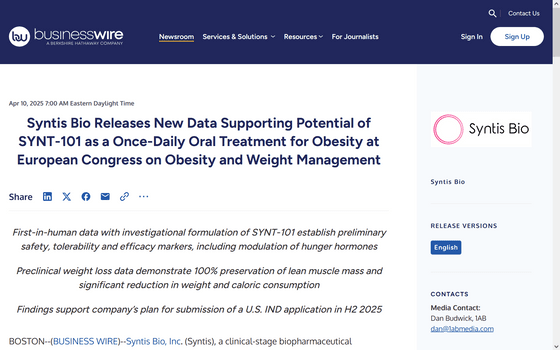Weight loss drug developed to reduce hunger while preserving muscle mass

Weight loss and obesity drugs often cause side effects such as nausea. A drug called SYNT-101 has been developed to avoid these symptoms and promote weight loss by inducing a feeling of fullness.
Syntis Bio Releases New Data Supporting Potential of SYNT-101 as a Once-Daily Oral Treatment for Obesity at European Congress on Obesity and Weight Management

Biotech firm creates weight loss pill that mimics the effects of gastric bypass surgery | TechSpot
SYNT-101, developed by SYNTIS Bio, is a drug that forms a temporary coating on the upper small intestine and directs nutrients to the lower small intestine, where hormones that cause satiety are activated. When the drug is taken, its two main components, dopamine and hydrogen peroxide, interact with catalase in the small intestine to form a membrane known as polydopamine. This membrane coats the upper small intestine and persists for approximately 24 hours before being naturally excreted.
This mechanism is believed to promote satiety and support weight loss, while at the same time maintaining lean body mass (body weight minus body fat), as well as the weight of muscles, bones, internal organs, etc. other than body fat.

In recent years, obesity drugs like Ozempic and Ugovi have been widely used that act on the GLP-1 hormone receptor, but they require injections and often have side effects such as nausea. SYNT-101, on the other hand, is a once-daily pill that is said to stimulate the secretion of appetite-regulating hormones more naturally.
In preclinical studies in rodents, SYNT-101 demonstrated consistent weight loss of 1% per week over six weeks while preserving 100% of lean body mass.
In human trials, subjects also recorded an average of 1% weight loss per week, as well as a 10% reduction in caloric intake and an 8% drop in fasting blood glucose levels. 'Notably, lean muscle mass was fully maintained over the course of the study, and no adverse events were observed,' Syntis Bio wrote. Promising hormonal changes were also evident during the study, with reduced levels of the hunger hormone ghrelin and increased levels of leptin, which regulates appetite. Tissue samples confirmed that the membrane formed as expected in the body and was safely removed within a day.

'The major pitfalls of current GLP-1 drugs are the loss of lean body mass associated with weight loss and the associated side effects. SYNT-101 has the potential to avoid these issues entirely,' said Dr. Louis Aronne, clinical advisor to Syntis Bio.
Syntis Bio says it plans to submit an investigational new drug application in the second half of 2025 and begin Phase 1 clinical trials shortly thereafter.
Related Posts:
in Science, Posted by log1p_kr







